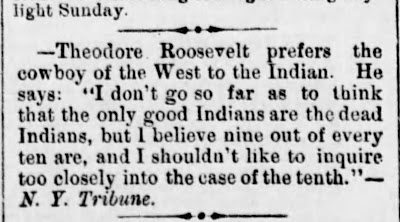1898: "We smoked our pipe of peace and put our cross mark on the white man's paper and thought all was well, but now our eyes are open."

In 1898, Cuba was finalizing their independence from Spain - in what is now known as the Cuban War of Independence . Carlos Montezuma was an "Educated Indian," Reservation A Mistake Parallels Between the Indian and the Cuban Situation Influences of Education (Written by an American Indians) [ Carlos Montezuma M.D .] ------------------------------------------------ 1898, November 6. The Chicago Tribune From the standpoint of humanity the condition of the Indians is much worse than that of the Cuban before the war. What have you done for the Cuban? You have spent millions and sacrificed many lives, and I hope the result will be a better civilization for them. They are our neighbors, but right here in our eyes is a nation -- the original Americans -- struggling, starving, and dying. When you seclude, feed, clothe, and pauperize able-bodied men and women, you make of the In


